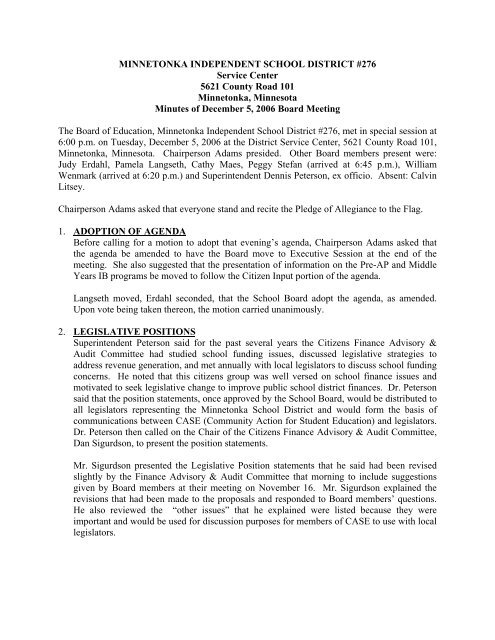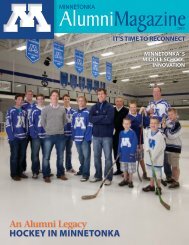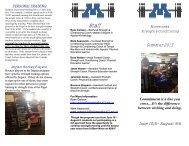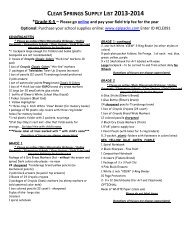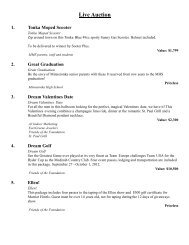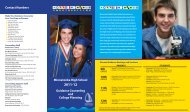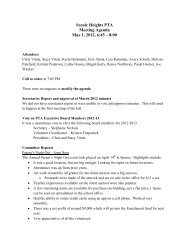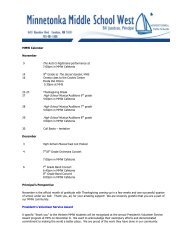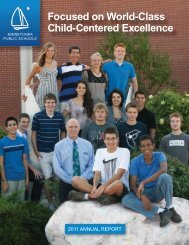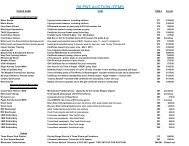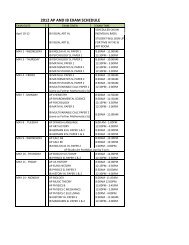MMW Teacher and Secondary Health Chair, Deanne Hoppe, spoke ...
MMW Teacher and Secondary Health Chair, Deanne Hoppe, spoke ...
MMW Teacher and Secondary Health Chair, Deanne Hoppe, spoke ...
You also want an ePaper? Increase the reach of your titles
YUMPU automatically turns print PDFs into web optimized ePapers that Google loves.
MINNETONKA INDEPENDENT SCHOOL DISTRICT #276<br />
Service Center<br />
5621 County Road 101<br />
Minnetonka, Minnesota<br />
Minutes of December 5, 2006 Board Meeting<br />
The Board of Education, Minnetonka Independent School District #276, met in special session at<br />
6:00 p.m. on Tuesday, December 5, 2006 at the District Service Center, 5621 County Road 101,<br />
Minnetonka, Minnesota. <strong>Chair</strong>person Adams presided. Other Board members present were:<br />
Judy Erdahl, Pamela Langseth, Cathy Maes, Peggy Stefan (arrived at 6:45 p.m.), William<br />
Wenmark (arrived at 6:20 p.m.) <strong>and</strong> Superintendent Dennis Peterson, ex officio. Absent: Calvin<br />
Litsey.<br />
<strong>Chair</strong>person Adams asked that everyone st<strong>and</strong> <strong>and</strong> recite the Pledge of Allegiance to the Flag.<br />
1. ADOPTION OF AGENDA<br />
Before calling for a motion to adopt that evening’s agenda, <strong>Chair</strong>person Adams asked that<br />
the agenda be amended to have the Board move to Executive Session at the end of the<br />
meeting. She also suggested that the presentation of information on the Pre-AP <strong>and</strong> Middle<br />
Years IB programs be moved to follow the Citizen Input portion of the agenda.<br />
Langseth moved, Erdahl seconded, that the School Board adopt the agenda, as amended.<br />
Upon vote being taken thereon, the motion carried unanimously.<br />
2. LEGISLATIVE POSITIONS<br />
Superintendent Peterson said for the past several years the Citizens Finance Advisory &<br />
Audit Committee had studied school funding issues, discussed legislative strategies to<br />
address revenue generation, <strong>and</strong> met annually with local legislators to discuss school funding<br />
concerns. He noted that this citizens group was well versed on school finance issues <strong>and</strong><br />
motivated to seek legislative change to improve public school district finances. Dr. Peterson<br />
said that the position statements, once approved by the School Board, would be distributed to<br />
all legislators representing the Minnetonka School District <strong>and</strong> would form the basis of<br />
communications between CASE (Community Action for Student Education) <strong>and</strong> legislators.<br />
Dr. Peterson then called on the <strong>Chair</strong> of the Citizens Finance Advisory & Audit Committee,<br />
Dan Sigurdson, to present the position statements.<br />
Mr. Sigurdson presented the Legislative Position statements that he said had been revised<br />
slightly by the Finance Advisory & Audit Committee that morning to include suggestions<br />
given by Board members at their meeting on November 16. Mr. Sigurdson explained the<br />
revisions that had been made to the proposals <strong>and</strong> responded to Board members’ questions.<br />
He also reviewed the “other issues” that he explained were listed because they were<br />
important <strong>and</strong> would be used for discussion purposes for members of CASE to use with local<br />
legislators.
2<br />
Erdahl moved, Langseth seconded, that the School Board approve the 2007 Legislative<br />
Position Statement, as presented (Addendum –A-). Upon vote being taken thereon, the<br />
motion carried unanimously.<br />
3. COURSE DELETION<br />
Director of Teaching & Learning, Mark Larson, presented the proposal for the deletion of the<br />
Family <strong>and</strong> Consumer Science (FACS) Culinary Exploration course at Minnetonka High<br />
School. Dr. Larson noted that the course had not generated sufficient enrollment to run the<br />
last three years.<br />
Erdahl moved, Maes seconded, that the School Board delete Course #4501: Family <strong>and</strong><br />
Consumer Science (FACS) Culinary Exploration. Upon vote being taken thereon, the<br />
motion carried unanimously.<br />
4. UPDATE ON ENROLLMENT AND Q-COMP<br />
Assistant Superintendent for Human Resources, Mike Lovett, noted that this would be the<br />
first public update to the Board on the Q-Comp program since the District began<br />
implementation. Dr. Lovett said that the original plan was to have this presentation on<br />
December 7; however, it had been moved to this evening because of the lengthy agenda<br />
already established for December 7. Because Ms. Ginther was out of town that evening,<br />
there would be a more detailed presentation at the first meeting in January.<br />
Dr. Lovett talked about the work of Q-Comp Coordinator, Bev Ginther, who he said had<br />
worked closely with the Oversight Committee to lay the foundation for a successful<br />
implementation. He also talked the appointment of <strong>Teacher</strong> Instructional Coaches <strong>and</strong> the<br />
work done to find suitable replacements for these teachers. Dr. Lovett said he wanted to<br />
assure parents that if there was a teaching change in the second semester, the transition<br />
would be a smooth one for students. He said he also needed to be sure that the students <strong>and</strong><br />
families affected by this change understood the rationale behind it.<br />
In the discussion that followed, Board member Erdahl commented that Ms. Ginther was<br />
doing “a wonderful job” on the Q-Comp newsletter.<br />
5. ENROLLMENT<br />
Dr. Peterson said that as a neighboring district struggled with budget decisions, residents of<br />
that district were showing a great deal of interest in Minnetonka schools. He said while<br />
some of them move immediately, most families were waiting to enter Minnetonka Schools<br />
under the open enrollment plan next year. Dr. Peterson said this situation was being<br />
monitored closely because this influx of students could add to the District’s challenges.<br />
6. POLICIES—Second Reading<br />
Policy #461: Administrative Performance Review. Dr. Peterson said this policy now<br />
included the changes suggested by the Board <strong>and</strong> was ready for adoption.
3<br />
Wenmark moved, Erdahl seconded, that the School Board approve Policy #461:<br />
Administrative Performance Review, as presented for a second reading. Upon vote being<br />
taken thereon, the motion carried unanimously.<br />
Langseth moved Erdahl seconded, that the School Board delete Policy A-14: Administrators-<br />
Performance Review. Upon vote being taken thereon, the motion carried unanimously.<br />
Policy #462: Designation of Authority During Absence. Dr. Peterson said this policy was<br />
now ready for Board approval.<br />
Langseth moved, Wenmark seconded, that the School Board approve Policy #462:<br />
Designation of Authority During Absence, to replace Administrative Rules <strong>and</strong> Procedures<br />
D-2: Designation of Authority During Absence, <strong>and</strong> that Administrative Rules <strong>and</strong><br />
Procedures D-2: Designation of Authority During Absence be deleted. Upon vote being<br />
taken thereon, the motion carried unanimously.<br />
Policy #409: Copyright Policy. Dr. Peterson said the language of this policy was now<br />
revised <strong>and</strong> that the Board had talked about Board members Litsey <strong>and</strong> Wenmark meeting in<br />
subcommittee with Dr. Peterson to look at this policy further <strong>and</strong> to decide if a policy on<br />
copyright was needed.<br />
Langseth moved, Maes seconded, that the School Board direct Policy #409: Copyright, to a<br />
Board subcommittee consisting of Board members Litsey <strong>and</strong> Wenmark for further review.<br />
Upon vote being taken thereon, the motion carried unanimously.<br />
At this point in the proceedings, Board members took a short break.<br />
TAX HEARING<br />
At 7:00 p.m., <strong>Chair</strong>person Adams called the meeting to order <strong>and</strong> announced that the tax<br />
hearing would take place. She asked that anyone wishing to address the Board at this time<br />
sign card <strong>and</strong> give it to the Board secretary.<br />
Dr. Peterson said the tax hearing was a legal requirement for all School Districts in<br />
Minnesota. He said the background materials used by the Board as they considered the<br />
proposed tax levy were available for members of the audience, <strong>and</strong> at the end of the hearing<br />
there would be a vote to hold a subsequent hearing on December 21 at which time the Board<br />
would also set the levy. Dr. Peterson then called upon Tom Berge to present the tax levy.<br />
By way of a PowerPoint presentation, Mr. Berge provided background information on the<br />
tax levy <strong>and</strong> focused his comments on what determines the levy; trends in the legislative<br />
funding formulas; Minnetonka’s budget challenges; factors driving the 2007 tax increase;<br />
<strong>and</strong> taxes on specific properties. He also noted that Minnetonka had worked hard to keep<br />
spending within the resources provided by the legislature <strong>and</strong> the property tax increases since<br />
2001 were a result of legislative changes in funding, voter approval or needed to address<br />
deferred maintenance projects. Mr. Berge said a study published in mid-2006 by the State
4<br />
Auditor analyzing school spending FY2002 through 2005 showed “very careful management<br />
of resources by Minnetonka Schools.”<br />
Mr. Berge summarized the major factors impacting the proposed 2007 property tax increase,<br />
including deferred facility maintenance needs; the <strong>Health</strong> <strong>and</strong> Safety levy; <strong>and</strong> the<br />
Technology <strong>and</strong> Referendum levies. He said that the proposed levy would provide funds to<br />
finance deferred maintenance needs; would enable to the District to avoid borrowing money<br />
to defer the property tax impact <strong>and</strong> increasing future debt levies; would result in a reduced<br />
deferred maintenance levy for 2008; <strong>and</strong> enable continued growth of technology to serve<br />
more students, staff <strong>and</strong> parents.<br />
In outlining school property tax trends, Mr. Berge said that Minnetonka was not receiving<br />
more money through property taxes than six years ago, even though some residents may be<br />
paying more property taxes to schools. He noted that the District was now collecting 18<br />
percent or $6.8 million less in 2007 than six years ago in 2001. Mr. Berge also explained<br />
some of the factors that affect property taxes, including a change in the taxable market value;<br />
changes relative to other properties that can shift the tax burdens over time; the fact that<br />
homes are charged at a different rate than businesses for a significant portion of school taxes;<br />
<strong>and</strong> municipality taxes that can vary throughout the eleven different cities <strong>and</strong> two counties<br />
encompassed by the District.<br />
<strong>Chair</strong>person Adams invited anyone in the audience who wished to address the Board on the<br />
property tax issue, to come forward. No one responded to this invitation to speak.<br />
Langseth moved, Maes seconded, that the School Board, having conducted a public hearing<br />
on the proposed 2007 tax levy <strong>and</strong> current year budget at which time all interested parties<br />
were offered the opportunity to speak for or against the proposed tax levy; that the School<br />
Board set December 21, 2006, 7:00 p.m. at the District Service Center, 5621 County Road<br />
101, Minnetonka, as the date, time <strong>and</strong> location for the subsequent public hearing on the<br />
proposed 2007 property tax levy <strong>and</strong> for action certifying the final levy. Upon vote being<br />
taken thereon, the motion carried unanimously.<br />
Wenmark moved, Maes seconded, that the Public Hearing on the proposed 2007 Property<br />
Taxes be closed. Upon vote being taken thereon, the motion carried unanimously.<br />
7. CITIZEN INPUT<br />
<strong>Chair</strong>person Adams said the Board would be taking comments that evening on the proposed<br />
instructional models being proposed. She explained that at the study session on November<br />
30 the proposed models were presented to the Board, <strong>and</strong> at that time there was no Board<br />
deliberation <strong>and</strong> no votes were taken. “Our job begins tonight,” she said, “when we listen to<br />
the community.” <strong>Chair</strong>person Adams noted that on December 7 the Board would have more<br />
in-depth discussions <strong>and</strong> by that time there would be a clearer picture of the agenda for<br />
December 21.<br />
<strong>Chair</strong>person Adams explained the guidelines for Community Comments <strong>and</strong> called upon the<br />
following speakers.
5<br />
<strong>MMW</strong> <strong>Teacher</strong> <strong>and</strong> <strong>Secondary</strong> <strong>Health</strong> <strong>Chair</strong>, <strong>Deanne</strong> <strong>Hoppe</strong>, <strong>spoke</strong> about the work done<br />
during the recent health curriculum review process <strong>and</strong> shared opinions she had gathered<br />
from health professionals throughout the State on the proposed model. Ms. <strong>Hoppe</strong> said no<br />
other school districts were aware of or using this model <strong>and</strong> said she opposed the new model<br />
because it did not teach skill-building.<br />
MME <strong>Health</strong> <strong>Teacher</strong>, S<strong>and</strong>y Gosen, talked about the service learning component of<br />
health education <strong>and</strong> the need for structured time to reflect on that service. She encouraged<br />
the Board to keep this as part of whatever delivery model was adopted. Ms. Gosen also<br />
expressed her concern about the process <strong>and</strong> asked that the Board consider keeping a<br />
program where students would have a traditional semester course <strong>and</strong> that a pilot or phase-in<br />
approach be used to incorporate health education grades 9-12.<br />
Minnewashta 5 th grade teacher <strong>and</strong> K-5 <strong>Health</strong> <strong>Chair</strong>, Adam Jorgenson, <strong>spoke</strong> about the<br />
lengthy health curriculum review process at which time many ideas were discussed about<br />
what was best for health education. He reported that three months after the review, the<br />
committee received word that there was “…a fundamental change in health education,” a<br />
decision in which he said the committee had no input. He asked that the District’s health<br />
professionals be included in future discussions on this or any other model being considered<br />
so ideas could be shared.<br />
MME/MME <strong>Health</strong> teacher Teena Bolin, <strong>spoke</strong> to the proposals for change in the high<br />
potential program <strong>and</strong> said she was happy that the Board was considering extending these<br />
services. Ms. Bolin cautioned the Board about further changes as they dealt with big budget<br />
concerns <strong>and</strong> the consequences of moving from a seven to a six-period day. With regard to<br />
the health education model Ms. Bolin said she felt the proposed model was not<br />
developmentally appropriate <strong>and</strong> asked that the Board be sure that programs such as IB <strong>and</strong><br />
AP that served smaller groups did not interfere with health education that affected 100<br />
percent of the students.<br />
MHS <strong>Health</strong> teacher, Nancy Schuett, expressed her concern about the proposed delivery<br />
model, saying she was afraid that informational models do not always teach. She also said<br />
she felt “very strongly” about the importance of health education being taught within the<br />
relationship of the classroom <strong>and</strong> the teachers.<br />
<strong>MMW</strong> 8th grade teacher Susan Brzezinski <strong>spoke</strong> about the importance of having teachers<br />
be part of the decision-making process <strong>and</strong> encouraged Board members to work with the<br />
health teachers, involve them in the decisions <strong>and</strong> to give them credit for their expertise,<br />
talents <strong>and</strong> dedication to students.<br />
Kristy Burgeson, MHS Math teacher said her concern was with how the change in the<br />
health program would affect the core subjects. She questioned the implementation of the<br />
new health instruction model <strong>and</strong> whether the math department would be restructured as a<br />
result of this change.
6<br />
Former health teacher Jen Severson, said she had concerns about the prevention piece of<br />
the proposed health model. She questioned whether students would be able to get the skills<br />
they need during their high school careers to prevent unhealthy situations rather than fix<br />
them.<br />
Parent Ron Leaf addressed the proposed High Potential program changes <strong>and</strong> <strong>spoke</strong> about<br />
his daughter’s academic successes even though she had not been selected as part of the<br />
Wings program. Mr. Leaf suggested that the Board study what happens to students who are<br />
selected <strong>and</strong> participate in high potential programs <strong>and</strong> those who don’t but go on to achieve<br />
academic successes. He also suggested that the Board seek feedback from students who had<br />
participated in the program, saying their perspective could be helpful <strong>and</strong> interesting.<br />
Paul Forst expressed his full support of the Language Immersion Program <strong>and</strong> the concept<br />
of neighborhood schools. He questioned the process to determine which languages would be<br />
offered <strong>and</strong> asked for clarification of recent communications relative to the schools at which<br />
the program would housed.<br />
Superintendent Peterson responded to the questions raised by Mr. Forst. He stated that the<br />
basic issue with language immersion is that it would be determined by the parents. Dr.<br />
Peterson said that while the District would offer what they believed were languages of<br />
interest, if there was little or no interest on the part of the families in those languages, it<br />
would not happen. “This will be driven by decisions parents make after being informed of<br />
the options,” he stated.<br />
Minnetonka resident R.C.H. Schmidt expressed his opinions about the proposed health<br />
education, language immersion <strong>and</strong> high potential models. Mr. Schmidt stated that health<br />
education should be part of the physical education program; that Arabic be one of the<br />
languages considered for an Immersion program; <strong>and</strong> that the Board was “overreaching” if<br />
they considered a program for a small number of highly gifted students. He also <strong>spoke</strong> to the<br />
proposal to extend the IB program to the middle school level <strong>and</strong> questioned the<br />
communications relative to the instructional models presentations.<br />
MME teacher <strong>and</strong> President of the Minnetonka <strong>Teacher</strong>s Association, Mark<br />
Chalupsky, shared his disappointment in having to come before the Board that night to bring<br />
the message from the Governance Board that they were opposed to the new model for health<br />
education. While he acknowledged there were many good things in the proposal, he said<br />
there were many unanswered questions <strong>and</strong> perhaps too many problems to overcome. Mr.<br />
Chalupsky asked that the Board <strong>and</strong> the teachers work through this issue collaboratively<br />
before action was taken <strong>and</strong> said if the District was going to make changes that they spend<br />
the money so every student would benefit. He suggested that the six-period day be<br />
reevaluated to learn what students, parents <strong>and</strong> staff were saying <strong>and</strong> that consideration be<br />
given to returning to a seven-period day.<br />
Parent <strong>and</strong> District volunteer, Mary Wiersum, questioned the wisdom of making major<br />
changes before the District was more financially stable. She cited the recent budget cuts <strong>and</strong><br />
the fact that the District still had not filled the Director of Finance position. Ms. Wiersum
7<br />
suggested if the resources were available, that the Board consider reinstating some of the<br />
programs that were cut before committing funds to new programs. She asked that the<br />
Board’s top priority be a return to the seven-period day <strong>and</strong> asked for more time as a<br />
community to discuss <strong>and</strong> consider the changes being proposed that evening.<br />
Parent <strong>and</strong> District volunteer, Lisa Wagner, <strong>spoke</strong> about her experiences as part of the<br />
Strategic Planning Team <strong>and</strong> commended the Board for coming forward with the<br />
recommendations on the new models. Ms. Wagner said she was a participant on the teams<br />
that worked on the Language Immersion, Pre A-P, <strong>and</strong> the Middle Years IB models<br />
strategies <strong>and</strong> that it was exciting to see that hard work now being considered. She praised<br />
the proposed changes to the high potential program <strong>and</strong> encouraged the Board to continue to<br />
study the new models so she could look forward to having some of them available to her<br />
children in the future.<br />
Parent Anne Groten directed her comments to the changes in the high potential program,<br />
<strong>and</strong> asked that the Board think of students in this program as a group of learners who<br />
“…learn differently <strong>and</strong> at a different pace.” She asked that their learning styles <strong>and</strong> needs<br />
be considered because that there had been no changes to this program in a very long time.<br />
Parent Carol Osterhus addressed the proposal for the Language Immersion program,<br />
saying she was “very encouraged” by the plan to offer Chinese. Until that time, Ms.<br />
Osterhus said she had considered moving out of the District so her children could be served<br />
by such a program.<br />
Parent Maureen Kvam expressed her excitement about the new proposals, saying she was<br />
especially excited about the proposed changes to the high potential program. With regard to<br />
the health model, Ms. Kvam said her biggest concern was with the students taking classes on<br />
line because of the constraints imposed by the six-period day. While she encouraged the<br />
Board to look at new models, she asked that they not include on-line learning options.<br />
Excelsior parent Anne Gallentine urged the Board to consider changes to the High<br />
Potential program <strong>and</strong> asked that they support <strong>and</strong> continue to look at the new models being<br />
proposed.<br />
Parent Cindy Montoriol said it was important for students to know another language “from<br />
the beginning.” She shared her concerns about the current high potential program <strong>and</strong> said<br />
“yes” to an immersion program <strong>and</strong> “yes” to the proposed IB program.<br />
Minnewashta parent, Brette Herman, encouraged the Board to consider the new high<br />
potential programs, noting that clustering was “very positive.” She said her student was<br />
getting a lot out of the current program.<br />
At this point in the proceedings, <strong>Chair</strong>person Adams asked Director of Communications,<br />
Janet Swiecichowski, to talk about the communications tools used to inform staff members<br />
<strong>and</strong> the community about the Board’s work on the new instructional models.
8<br />
Ms. Swiecichowski outlined the communications efforts to inform staff <strong>and</strong> community<br />
residents about the new instructional models. These included press releases to local <strong>and</strong><br />
metro newspapers; the Minnetonka School News postcard that goes to every household in<br />
the District; the electronic newsletter that is sent the day after each Board meeting <strong>and</strong> that<br />
summarizes action taken; web site resources that included all of the PowerPoint<br />
presentations; a Question <strong>and</strong> Answer sheet; an interactive response area <strong>and</strong> an on-line form<br />
where people could comment <strong>and</strong> give their opinions on the models. Ms. Swiecichowski<br />
said the District’s website would be updated during the next two months so the community<br />
would be aware of when the proposals were being considered <strong>and</strong> that information would be<br />
distributed to people using the Early Childhood Family Education programs.<br />
At this point in the proceedings, Board members took a short break.<br />
8. PRE-AP MODEL<br />
Superintendent Peterson explained that the Pre-AP program was a new concept <strong>and</strong> Dr.<br />
Larson would provide the background information.<br />
By way of a PowerPoint presentation, Dr. Larson explained that the goal of Advanced<br />
Placement (AP) classes was to provide a challenging <strong>and</strong> rigorous curriculum for high<br />
achieving students <strong>and</strong> that these courses at the high school level culminate in an assessment<br />
that may award college credit. Dr. Larson said that the Pre-Advanced Placement model was<br />
an extension of this Advanced Placement model. He noted that the courses cover some of<br />
the main themes offered at the high school level with the intention of preparing middle level<br />
students with a preview <strong>and</strong> introduction to the rigor <strong>and</strong> expectations of a high school level<br />
AP course. While the curriculum is similar to the high school level, Dr. Larson said it was<br />
geared toward middle level learners, specifically 6 th - 8 th graders.<br />
Dr. Larson also <strong>spoke</strong> about Advanced Placement Vertical Teaming that he explained was a<br />
group of teachers from different grade levels in a given discipline working cooperatively to<br />
develop <strong>and</strong> implement a vertically aligned program aimed at helping students acquire the<br />
skills necessary for success in the Advanced Placement Program. He also addressed how<br />
students would be selected; where the program should be located; how the program would be<br />
implemented; <strong>and</strong> the costs <strong>and</strong> benefits of providing the Pre-AP model for students.<br />
Dr. Larson said there was still much work to be done <strong>and</strong> that the program could not be ready<br />
for 2007-08. He said that it was important to collect public input on the initiative <strong>and</strong> to get<br />
direction from the School Board. “If the program is adopted, we would need to hold public<br />
information sessions, work with the staff to build support; identify teachers for training <strong>and</strong><br />
implementation <strong>and</strong> begin the application process for students,” he said.<br />
9. MIDDLE YEARS IB PROGRAM<br />
By way of a PowerPoint presentation, Dr. Larson gave a description of the Middle Years<br />
International Baccalaureate Programme, whose mission he said was to “…develop<br />
inquiring, knowledgeable, <strong>and</strong> caring young people who help to create a better <strong>and</strong> more<br />
peaceful world through intercultural underst<strong>and</strong>ing <strong>and</strong> respect.” He explained that the
9<br />
Strategic Plan approved in 2003 had an IBO component <strong>and</strong> the 2004-05 Instructional<br />
Models Task Force recommended pursuing the Middle Years IB model.<br />
Dr. Larson <strong>spoke</strong> about the eight subject groups of the curriculum <strong>and</strong> explained the areas of<br />
interaction including approaches to learning; community awareness; health <strong>and</strong> social<br />
education <strong>and</strong> the environment. He also outlined the areas of focus that included<br />
communication; holistic learning; internationalism <strong>and</strong> cultural awareness <strong>and</strong> shared<br />
information on how students were selected; where the programme should be located; the<br />
challenges <strong>and</strong> solutions; start-up costs; <strong>and</strong> the next steps that would include gathering<br />
public input <strong>and</strong> getting direction from the School Board.<br />
Middle School Principal, Bill Jacobson, expressed his enthusiasm for the program, saying it<br />
was a “perfect fit” at the middle level. He said staff members were supportive <strong>and</strong><br />
enthusiastic about the program because it “…aligned with everything they want to do for<br />
their students in middle school.”<br />
Discussion followed, at which time Board members shared their opinions about the Pre-AP<br />
<strong>and</strong> Middle Years IB programs. Board member Stefan said both were “very interesting<br />
concepts,” but said she did not think she could support either of them for the upcoming fall.<br />
Board member Wenmark expressed caution because of the cost of the program <strong>and</strong> his<br />
reluctance to “outsource our students to anybody.” <strong>Chair</strong>person Adams said she was<br />
personally “very interested” in both the Pre-AP <strong>and</strong> Middle Years IB programs, <strong>and</strong><br />
applauded the analysis <strong>and</strong> wisdom of staff members in looking at what happens at the<br />
middle school level because of the impact it has on the success of the program at the high<br />
school. Dr. Peterson said because it was important to consider how Pre-AP <strong>and</strong> middle years<br />
IB programs at one or both middle schools would impact students moving to the high school,<br />
these programs would have to be studied for at least a year.<br />
Board members then discussed next steps in the consideration of the instructional models<br />
presented that evening.<br />
10. ADJOURNMENT TO EXECUTIVE SESSION<br />
Langseth moved, Erdahl seconded, adjournment to executive session at 10:45 p.m. Upon<br />
vote being taken thereon, the motion carried unanimously.<br />
____________________________________<br />
Pamela J. Langseth, Clerk


